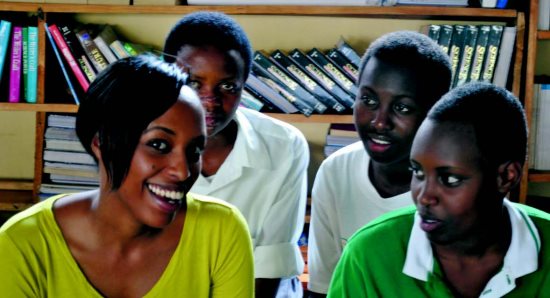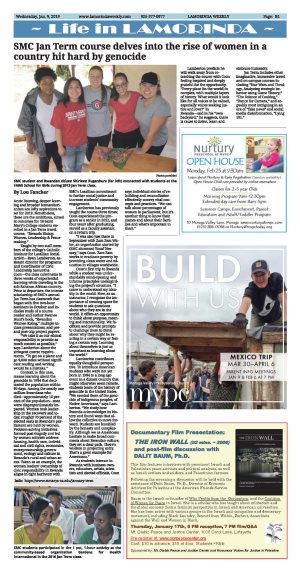|
|
Published January, 9th 2019
|
SMC Jan Term course delves into the rise of women in a country hit hard by genocide
|
|
| By Lou Fancher |
 |
| SMC students participated in the 1 pot, 1-hour activity at the community-based organization Gardens for Health International in the 2016 Jan Term class. Photos provided |
Acute listening, deeper learning and broader humanitarianism are lofty aspirations to set for 2019. Nonetheless, these are the ambitious, aimed at outcomes for 18 Saint Mary's College students enrolled in a Jan Term travel course, "Rwanda Rising: Women, Leadership & Peacemaking."
 Taught by two staff members of the college's Catholic Institute for Lasallian Social Action-Ryan Lamberton, assistant director for programs, and Coordinator of Civic Leadership Samantha Coon-the class culminates in three weeks of experiential learning while traveling in the sub-Saharan African country. Prior to departure, the intense scholarship of SMC's annual Jan Term has classwork that began with five two-hour seminars in October and includes study of a course reader and author Swanee Hunt's book, "Rwandan Women Rising," multiple in-class presentations, and pre- and post-trip project papers.
Taught by two staff members of the college's Catholic Institute for Lasallian Social Action-Ryan Lamberton, assistant director for programs, and Coordinator of Civic Leadership Samantha Coon-the class culminates in three weeks of experiential learning while traveling in the sub-Saharan African country. Prior to departure, the intense scholarship of SMC's annual Jan Term has classwork that began with five two-hour seminars in October and includes study of a course reader and author Swanee Hunt's book, "Rwandan Women Rising," multiple in-class presentations, and pre- and post-trip project papers.
 "We take it as our ethical responsibility to provide as much context as possible," says Lamberton about the stringent course requirements. "To get on a plane and go 9,000 miles without significant reading and writing would be a mistake."
"We take it as our ethical responsibility to provide as much context as possible," says Lamberton about the stringent course requirements. "To get on a plane and go 9,000 miles without significant reading and writing would be a mistake."
 Context, in this case, means learning about the genocide in 1994 that decimated the population within 90 days. Among the nearly one million Rwandans who died-approximately 10 percent of the population-men were disproportionately impacted. Women took leadership in the recovery and today, roughly 70 percent of the elected seats in Rwanda's parliament are held by women. Problem-solving initiatives formed post-tragedy and led by women activists address housing, health care, individual and civil rights, economics, entrepreneurship, government, ecology and culture in Rwanda's rural and urban areas. Taken as an example, the women leaders' ownership of civic responsibility in Rwanda aligns in tight harmony with SMC's Lasallian commitment to further social justice and increase students' community engagement.
Context, in this case, means learning about the genocide in 1994 that decimated the population within 90 days. Among the nearly one million Rwandans who died-approximately 10 percent of the population-men were disproportionately impacted. Women took leadership in the recovery and today, roughly 70 percent of the elected seats in Rwanda's parliament are held by women. Problem-solving initiatives formed post-tragedy and led by women activists address housing, health care, individual and civil rights, economics, entrepreneurship, government, ecology and culture in Rwanda's rural and urban areas. Taken as an example, the women leaders' ownership of civic responsibility in Rwanda aligns in tight harmony with SMC's Lasallian commitment to further social justice and increase students' community engagement.
 Lamberton has previously taught the course three times; Coon experienced the program as a senior in 2012, and four years after graduating, served as a faculty assistant on a return trip.
Lamberton has previously taught the course three times; Coon experienced the program as a senior in 2012, and four years after graduating, served as a faculty assistant on a return trip.
 "I was also just there in September with Zam Zam Water, an organization started by (SMC alumnus) Yusuf Nessary," says Coon. Zam Zam works to eradicate poverty by providing clean water and education in villages worldwide. Coon's first trip to Rwanda while a student was understandably mind-opening and informs principles undergirding the project's structure. "I came to understand my identity in the world. Now, as an instructor, I recognize the importance of creating space for students to ask questions about who they are in the world. It offers an opportunity to think about purpose, meaning and intentionality. We facilitate and provide prompts to challenge them to think about why they might be reacting in a certain way or feeling a certain way. Learning about themselves is just as important as learning about the world."
"I was also just there in September with Zam Zam Water, an organization started by (SMC alumnus) Yusuf Nessary," says Coon. Zam Zam works to eradicate poverty by providing clean water and education in villages worldwide. Coon's first trip to Rwanda while a student was understandably mind-opening and informs principles undergirding the project's structure. "I came to understand my identity in the world. Now, as an instructor, I recognize the importance of creating space for students to ask questions about who they are in the world. It offers an opportunity to think about purpose, meaning and intentionality. We facilitate and provide prompts to challenge them to think about why they might be reacting in a certain way or feeling a certain way. Learning about themselves is just as important as learning about the world."
 Lamberton contributes equally thoughtful perspective. To introduce American students who were not yet born in 1994 to a long ago event in a distant country that might otherwise seem remote, students learn of the history of genocide in the United States. "We remind them of the genocide of indigenous peoples, of Native Americans," says Lamberton. "We study how Rwanda acknowledges its history and found ways that allow the collective to move forward. Students are humbled by the honesty and complexity. Although we as Americans hesitate to make broad comments about Rwandan culture, they set a clear path. There's wisdom in projecting unity. That's a great example for Americans."
Lamberton contributes equally thoughtful perspective. To introduce American students who were not yet born in 1994 to a long ago event in a distant country that might otherwise seem remote, students learn of the history of genocide in the United States. "We remind them of the genocide of indigenous peoples, of Native Americans," says Lamberton. "We study how Rwanda acknowledges its history and found ways that allow the collective to move forward. Students are humbled by the honesty and complexity. Although we as Americans hesitate to make broad comments about Rwandan culture, they set a clear path. There's wisdom in projecting unity. That's a great example for Americans."
 As students interact in Rwanda with business owners, educators, artists, scientists and elected officials, Coon says individual stories of rebuilding and reconciliation effectively convey vital concepts and practices. "We can talk about percentages of women in parliament, but it's another thing to know their names and about their families and what's important to them."
As students interact in Rwanda with business owners, educators, artists, scientists and elected officials, Coon says individual stories of rebuilding and reconciliation effectively convey vital concepts and practices. "We can talk about percentages of women in parliament, but it's another thing to know their names and about their families and what's important to them."
 Lamberton predicts he will walk away from co-teaching the course with Coon feeling inspired and deeply grateful for the opportunity. "Every place (in the world) is complex, with multiple layers of history. What would it look like for all voices to be valued, especially voices seeking justice and love?" In Rwanda-and in his "own backyard," he suggests, there is cause to listen, learn and embrace humanity.
Lamberton predicts he will walk away from co-teaching the course with Coon feeling inspired and deeply grateful for the opportunity. "Every place (in the world) is complex, with multiple layers of history. What would it look like for all voices to be valued, especially voices seeking justice and love?" In Rwanda-and in his "own backyard," he suggests, there is cause to listen, learn and embrace humanity.
 Jan Term includes other imaginative, immersive travel and on-campus courses including "Star Wars and Theology, Analyzing strategic behavior using Game Theory," "The Science of Cooking," "Dance for Camera," and arguably most intriguing in an era of "fake news" and social media disinformation, "Lying 101."
Jan Term includes other imaginative, immersive travel and on-campus courses including "Star Wars and Theology, Analyzing strategic behavior using Game Theory," "The Science of Cooking," "Dance for Camera," and arguably most intriguing in an era of "fake news" and social media disinformation, "Lying 101."
 Info: https://www.stmarys-ca.edu/january-term
Info: https://www.stmarys-ca.edu/january-term |
 |
| |
| SMC student and Rwandan citizen Shirleen Ruganbura (far left)
connected with students at the FAWE School for Girls during 2013 Jan
Term class. |
|
| |
|
|
|
|
|
|
|
|




